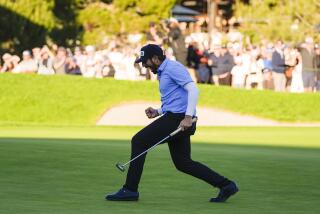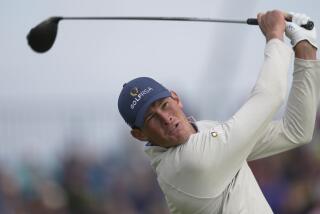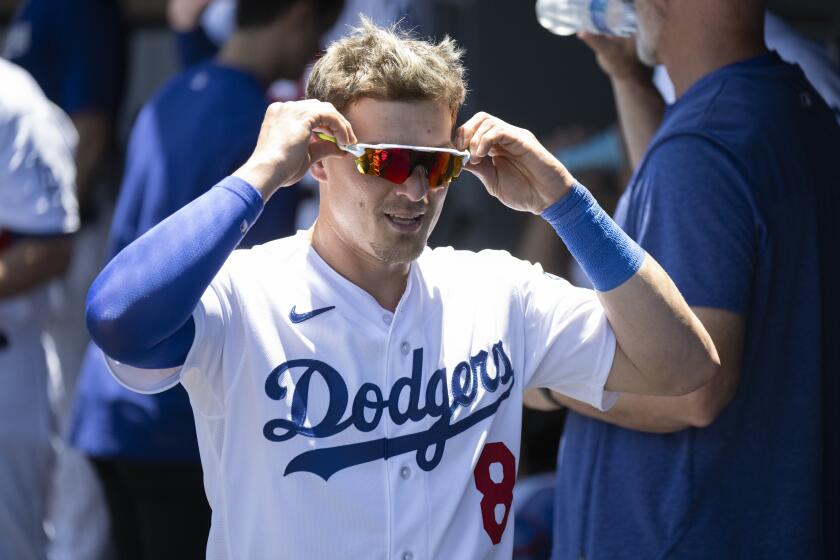Venturi Held Off a Near Collapse
- Share via
Hazy waves of heat moved in sizzling ripples from the ground, trapped against the scorched earth of the Congressional Country Club by a suffocating blanket of humidity.
Dazed and barely able to walk, Ken Venturi stumbled down the final fairway of the 1964 U.S. Open toward one of the most emotional victories in all of sports.
Hours earlier, in what was the last 36-hole final ever played in the Open, Venturi nearly collapsed on the 17th green of the day’s first 18 holes. Some thought he shouldn’t be allowed to continue.
But after a 45-minute break, Venturi went back out for the final round accompanied by a doctor who fed him a dozen salt tablets and ice tea as the temperature neared 100 in the sticky Potomac River valley near Washington.
After four years without a victory--a drought so bad that a priest from his hometown of San Francisco had to talk him out of quitting--Venturi completed one of the most courageous rounds of golf ever.
“The last 18 holes is kind of a haze,” Venturi, now a CBS golf commentator, said a week before this year’s Open at Congressional.
“I remember walking down 18,” he said. “I remember the applause with each step I took. It would stop when I went to hit my shot and then start again after I hit.”
Lost in the haze of his heat exhaustion, Venturi was not entirely certain where he stood in the tournament.
“I’m looking down and I could see the scoreboard across the pond and there was only one name in red numbers (under par), so I knew I had at least a two-shot lead,” Venturi said. “I didn’t know it was five.”
His weak drive on the last hole found the fairway, but he pushed his 5-iron second shot into a bunker right of the green, safely away from the water on the left side. He blasted the 40-yard sand shot to 10 feet then made the putt to win the Open by four strokes over Tommy Jacobs.
“I dropped my putter and I raised my arms up to the sky and I said, ‘My God, I’ve won the Open,” Venturi recalled. “The applause was deafening. It was like thunder coming out there.”
Venturi was so weak that his playing partner, 21-year-old Raymond Floyd, took his ball out of the cup.
“My first instinct was to throw it to the crowd until I realized how important the win was for him,” Floyd recalled. “And then it hit me what he had been through. Here was a guy who had been down so far. He was running on fumes.
“If you had asked him his name he could not have told you,” said Floyd, who was playing in his first Open. “And I saw him fight and scrap to win the most coveted thing in golf. It is one of the most heroic things I ever have seen.”
The emotion of the youthful Floyd reached through Venturi’s fog of dehydration.
“When I lost my composure was when I tried to pick my ball out of the hole,” Venturi said. “I couldn’t do it. Then I felt this hand on me and it was Raymond Floyd handing me the ball. I looked at him and he had tears streaming down his face.”
That Venturi, who hadn’t won since the 1960 Milwaukee Open, was in the Open at all was a victory. He needed to get through two 36-hole U.S. Open qualifiers, and in the second one shot a 77 in the first round and needed a 70 to make the field.
Venturi had never completely lived up to the promise he displayed in 1956 when he led the Masters after three rounds as an amateur then shot an 81 to finish second to Jack Burke Jr.
The 1964 Open was played in the Big Three era--Arnold Palmer, Jack Nicklaus and Gary Player. There was no reason to think Venturi would be a factor.
He was four strokes behind Palmer after a first round 72. Venturi shot a 70 in the second round but lost ground as Jacobs shot a 64 and was six strokes ahead going into the 36-hole finale.
The magic of the day began on the first hole. Venturi’s 10-foot birdie putt hung on the lip for nearly a minute before it fell into the cup.
“I said to myself, ‘Well, you’ve got a stroke to play with. Let’s go at every flag until we lose that stroke,”’ he said. “I went at every flag and shot 30.”
He followed the birdie on No. 1 with others on Nos. 4, 6, 8 and 9.
“I was on the flag the entire round,” Venturi said. “And not just short irons. I hit four 1-irons.”
As early morning heat turned into a midday inferno, Venturi, who had taken no precautions, began to weaken.
“I was from California,” he said. “What did I know about salt tablets? I didn’t even drink water.”
He felt the first wave of nausea and exhaustion on No. 16, then things got scary on the next hole when he had an 18-inch putt for par.
“I got over the ball and I started shaking so bad I couldn’t steady myself,” Venturi said. “It got black and I could barely see. I missed it.”
He also missed a 3-foot par putt on the final hole but still shot a 66, the lowest score of the round by three strokes. Venturi went into the final 18 holes two strokes behind Jacobs and four ahead of Palmer.
Accompanied by the doctor, encouraged by Floyd and playing on instinct, Venturi managed to shoot a 70, easily passing Jacobs, who shot a 76.
“All the practice I had done, I was relying on that,” Venturi said. “I wasn’t relying on swing thought. I was just trying to get from the green to the next tee and then to the next green.”
Floyd, stunned by what he was seeing, could not help but be supportive.
“Raymond kept saying to me, ‘We’re almost there. We’ve got to keep going,”’ Venturi said.
His last bit of help came from a USGA official.
“I was helped off the green by Joe Dye,” Venturi said. “I couldn’t sign the scorecard. The only way I could have lost was if I signed a wrong card and I was afraid. I couldn’t read it. It didn’t make sense.”
Once again, Venturi felt the hand of fate on his arm.
“Joe said, ‘Sign it, Ken. It’s correct,”’ Venturi said.
His signature was the final stroke of perhaps the most dramatic days of golf ever.
More to Read
Go beyond the scoreboard
Get the latest on L.A.'s teams in the daily Sports Report newsletter.
You may occasionally receive promotional content from the Los Angeles Times.










